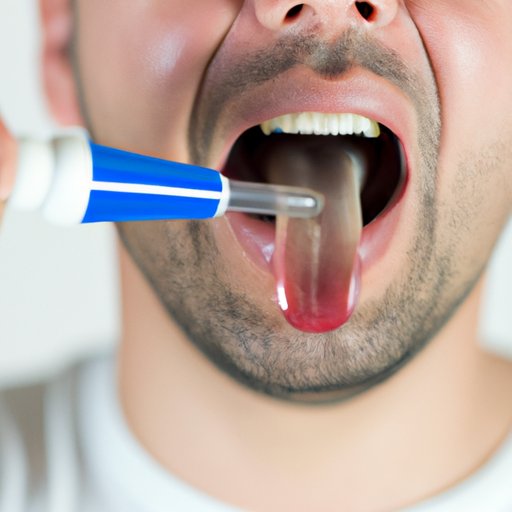
Introduction
Excessive saliva can be an embarrassing and inconvenient problem for many people. It can cause drooling, speech difficulties, social discomfort, and affect the quality of sleep. In this article, we will explore the causes of excessive saliva, practical tips to manage it, natural remedies to reduce saliva production, medical treatments available, and sleep management strategies. We hope to provide our readers with a comprehensive guide to help them understand how to stop too much saliva in mouth.
Causes of Excessive Saliva and How to Identify them
Before exploring any solutions for excessive saliva, it’s important to understand what normal levels of saliva production are. Saliva helps to digest food, lubricate the mouth, and prevent infection. The typical amount of saliva produced daily is around 1-2 liters in healthy adults. However, when the production is excessive, it may be a sign of an underlying condition or lifestyle factor.
Some possible causes of excessive saliva production are medications that stimulate the mouth, throat infections, poor oral hygiene, GERD, a neurological condition called Parkinson’s disease, and pregnancy. In order to identify the cause, it’s important to observe the patterns, timing, and other symptoms, such as nausea, difficulty swallowing, or coughing. For example, if salivation increases after taking a specific medication, it may be a side effect. Alternatively, if the salivation occurs mostly at night, it may be related to sleep positions or mouth breathing.
Practical Tips to Manage Excessive Saliva
There are some simple changes in diet and lifestyle habits that can help reduce saliva production. Avoiding spicy and acidic foods, limiting alcohol and caffeine intake, and managing stress levels are helpful tips. Practicing good oral hygiene can also help manage excessive saliva, such as using mouthwash or brushing teeth after meals. Quitting smoking is often recommended, as it can contribute to excessive saliva production.
Natural Remedies to Reduce Saliva Production
Sometimes, natural remedies can help reduce saliva production. Chewing gum, sucking on sour candy, or practicing mindfulness and relaxation techniques can help reduce saliva. Some herbal remedies like sage and peppermint can also help. However, it’s always important to consult with a healthcare provider before trying any alternative remedies to avoid potential side effects or interactions with medications.
Medications and Treatments to Manage Excessive Saliva
There are medications that can be used to manage excessive saliva, known as anticholinergics. These work by blocking the production of saliva. They are prescription-only, and a doctor should be consulted to determine the appropriate dosage and duration of treatment. Botox injections can also help reduce saliva production by weakening the muscles responsible for salivation. These injections should only be administered by a trained medical professional and are sometimes used as a last resort when other treatments have failed.
Managing Excessive Saliva During Sleep
Excessive saliva during sleep can cause drooling and affect the quality of sleep. There are ways to manage this issue, such as sleeping with the head and shoulders elevated to help with drainage. Special pillows designed to reduce saliva buildup can also help. Mouthguards or chin straps are sometimes used to keep the mouth closed and prevent drooling. It’s important to consult with a healthcare provider before using any sleep aids to avoid potential side effects or interactions with medications.
When to Seek Medical Advice and What to Expect During a Medical Evaluation
Excessive saliva may be a sign of an underlying condition that requires medical attention. If it is persistent, accompanied by other symptoms such as fever, sore throat, or difficulty swallowing, it is advisable to seek medical advice. During a medical evaluation, the healthcare provider may order tests and procedures to determine the cause, such as blood tests, imaging studies, or endoscopy. Treatment options will depend on the underlying cause and severity of the excessive salivation.
Conclusion
Excessive saliva can be uncomfortable and disruptive to daily life. However, there are many options available to help manage it. Practicing good oral hygiene, changing diet and lifestyle habits, and using natural remedies can be effective. Medical treatments like anticholinergics and Botox injections should only be used under the guidance of a healthcare provider. Finally, excessive saliva is not always a serious condition, but when in doubt, it is always better to seek medical advice to rule out other underlying health issues.





